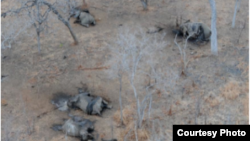The elephant population of Mozambique is under siege, conservationists say, after dozens of killings in recent weeks.
The government has put together a task force to address poaching in the country’s northern elephant reserve, where officials estimate two elephants are being killed each day.
Most of the carnage is taking place inside the Niassa National Reserve, a conservation area approximately the size of Denmark, and twice the size of South Africa’s famous Kruger National Park. The reserve is home to approximately 12,000 elephants.
Last month, a gang of poachers suspected of killing 39 elephants this year was arrested, and the World Conservation Society (WCS) counted 22 slaughtered elephants in the first two weeks of September.
According a recent report in Britain's Guardian, WCS said the Mozambique slaughter is occurring at an "unprecedented and 'industrialized'" rate that is seeing between 1,500 and 1,800 elephants poached annually.
The United Nations estimates poaching and ivory trafficking are at a 25-year high, with 170 tons of ivory traded in the past five years. Ivory demand has skyrocketed in Asia, along with the price.
World Wildlife Fund African Elephant coordinator Lamine Sanogo spoke to VOA News from Nairobi.
“This is a real concern, and the rate is increasing everyday," he said. "And we think that if there is no immediate solution, the elephant population is going to collapse seriously when you look at the poaching rate currently.”
Sanogo is especially concerned the poachers, many of whom he says are part of international crime syndicates and have sophisticated tools, outnumber and outclass the relatively small number of park rangers protecting Niassa’s elephants.
“This region of northern Mozambique is really critical for the conservation of the African elephant, and we really need more partners ... including government and the international community to join the effort to avert the issue before it becomes late.”
Mozambique is still recovering from a long civil war that ended two decades ago. Last year, the top rebel group turned opposition party threatened to again turn rebellious.
Those worries have since abated with a recent peace deal, but Sanogo says conservationists are worried about possible unrest during and after next week’s national elections.
“If it is a peaceful election, we do not think it is going to be a problem. But as you might know, the political instability makes more vulnerable the conservation of species," he said. "When there are political troubles and no one wants to go into the field, the protected areas are much more open for any illegal actions.”
He says with their numbers rapidly dwindling, elephants cannot afford to be caught in the middle.




